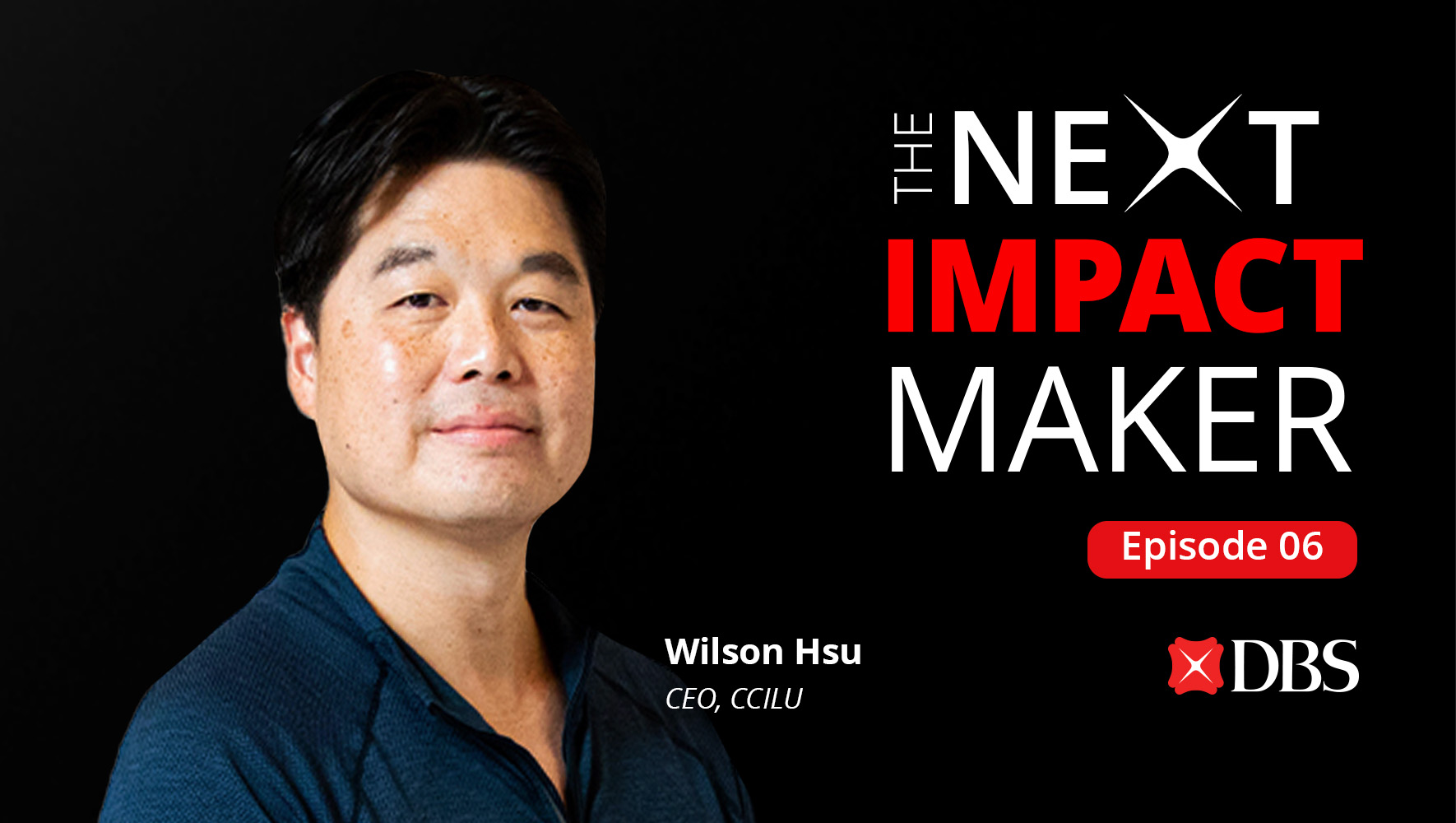These plastic bottles were made for walking

CCILU is an innovative shoe manufacturer hoping to revolutionise the fashion industry, which is notorious for creating unsustainable waste and excesses. They’re looking to harness plastic and agricultural waste to make their shoes, closing the loop for an industry that needs cleaning up.
Listen to this story
00:01
25:30
Listen to the episode now
In brief:
Having built his career in banking, CCILU founder Wilson decided to pivot away to creating impact with a product he could call his.
By first joining his father’s shoe business, he realised that he had an opportunity to turn the unsustainable fashion industry on its head with innovation.
Wilson experimented with ways of closing the loop and reducing waste by incorporating end of life materials into the materials of his brand of shoes CCILU.
Today, CCILU has not only successfully created technologies to turn different waste materials, such as agricultural waste, ocean plastic and silicone waste into shoe materials, he’s also bringing low-wage workers into the solutions’ ecosystem to help impact lives and livelihoods.
While he learnt the ropes of the business from his father’s traditional footwear business where success was measured by scale and profits, he believes in a business that has new measurements of success.
Wilson’s and his father’s differences in opinions on how to run a business does can cause arguments between them, but they respect the other’s background, beliefs and vision.
Daphne: Today on the next impact maker, we speak to a founder whose whole life changed because of superstar Jay Chou and is today seeking to change the way footwear is produced and manufactured with a circular economy. Wilson Hsu, founder and CEO of CCILU, joins us from Taiwan, where he's based. Now, CCILU is a 2022 DBS Foundation Grant Awardee, and as a footwear company, is on a mission to help us rethink materials and manufacturing processes in the fashion industry, while improving the lives and livelihoods of low wage workers. Welcome in, Wilson.
Wilson: Thank you, Daphne, and thank you for giving me this opportunity. My name is Wilson, the founder of CCILU Footwear.
After I finished my degree in school, I was a banker working in Taiwan and I was of a similar age to Jay Chou, and this was my first job, and also his, and we were in the same building. At that time, he was very slim, young, and shy.
Every morning, he would carry his guitars and go to the studio early, to work like me. I have a few memories of him at that early stage. After 8-9 years, I rented a DVD movie, and it happened to be the first movie of Jay Chou. It was “Secret”, right?
I was very surprised and shocked because this guy became a superstar. He was the director, the main actor and even composed all the music for the movie. Today, he pursues his own dream.
How about me? For sure, it was a great job and organisation. But I was still working for another person’s dreams and not mine. So, this was the magic moment for me. And I decided to quit the bank.
I wanted to create something which are my own products, and I can tell the story. I can sell that to people.
My father was actually a veteran in the industry from 50 years ago. He has the foundation and knowledge on how to make the shoes and the materials. So eventually I decided to follow him and join his manufacturing business in China, in Taiwan, and in many other different places.
“I learnt everything from the beginning and worked like an entry-level worker in the shop floors, trying to make the shoes, learning the new technologies, and everything else.”
Daphne: You weren't treated like the owner's son? He really made you go through the ropes?
Wilson: Yeah, yeah.
For DBS, or Citibank, the staff are always in a fancy place, in very good buildings and very beautiful offices. And all your colleagues look gorgeous and handsome.
But inside the factory of a manufacturing business, you see all the real things. On the table, from the fabric, the soles, to the shoelaces. There’ll be thousands of workers across the different factory buildings, and we would see all the materials coming in every day via the containers. And we have so many people working on a pair of shoes every day. We shipped so many pair of shoes.
Our factories run two shifts, two per day, which means 24 hours. At that time, we had a capacity of 50 million pairs per year on average. And if you can imagine, from my father’s time having started in 1979, he has already made more than 1.2 to 1.5 billion pairs of shoes to date. In the last century, we’ve seen what we call a linear economy. Compare that to what we call today – a circular economy (from the work at CCILU).
Daphne: It's mind blowing because of what we also know about how pollutive the whole fashion industry is.
Wilson: In total we contribute 10% of the carbon emissions globally every year, which is actually the second biggest source of the carbon emissions, only behind the petrol industry or energy industry.
I was pretty shocked! Because this 10% is equal to the carbon emissions of the whole of Europe. Actually, clothing, bags and shoes are mostly made from oil and petrol resources. They are mostly chemicals, which means that we use a lot of the resources from the globe. And the brands tell people “you guys have to buy more every season”.
In the fashion industry we have spring, summer, autumn and winter seasons. This doesn’t satisfy the customers. So, we add on holiday seasons with big brands even having five to six seasons per year now, to increase the sales of the company.
“This is a model generation one. This is model generation two…” till model generation forty. Then they ask people to change, to upgrade, to buy the new things. This is the rationale behind the industry, which drains the resources from the globe, making more products and selling them to people.
People have too much and then they start to throw them away. In the short term, we are happy because we are making more. Perhaps we are earning more.
But this is crazy. I'm not sure how long we can be on this same journey.
Daphne: So tell us more about CCILU, how you took things into your own hands and wanted to basically change the industry with your own vision.
Wilson: Around the year 2017 we started to make things differently. We started thinking – if everything comes from petrol and oil, can we have something different? Can we have the waste from other industries and create a technology to transform them into valuable material? Can we give them a second life to be a component or material of a pair of shoes?
With these questions in mind, we started investing, researching and upcycling coffee grounds, ocean plastics and even sought out waste that came from the semiconductor industry. Everybody uses phones which have chips. Before it becomes a chip, it had already undergone so many different processes, creating a lot of pollution.
We also upcycle agricultural waste like corn, oyster shells, tea leaves, bamboos, pineapples, and coconut as well. We have the capability of upcycling their waste and turning them into high performance material that we can use for our industry.
This is a major part of our company. We try to decrease the waste from other industries and turn it into good stuff for our industry.
Furthermore, we address the waste from our company as well, because even though we use upcycled material to make the shoes, at end of the day, people still wear them out, which becomes a waste.
So we have two other technologies to tackle this. The first process that we use is what we call pyrolysis in which we use very high temperature and no oxygen. Through that process, one pair of shoe waste becomes 2-300 grams of diesel, and we use that diesel to generate the electricity.
One pair of the shoe waste equals to around 2 kw/hr. So, four pair of shoes is able to support the household for one day.
The other post-consumer technology we call closed-loop. Using that material, we can manufacture shoes, which can be 100% recyclable and reusable. We can use the same material to produce a nice pair of a shoe.
We created subscription and membership programmes where customers pay a fixed amount per year, and we send them a pair of shoes. But when it becomes a waste, we will take that back to remake them to be a new pair of shoes and send it back to them. This way they can wear 100 different pairs of new shoes while using the same material.
We have created a closed loop business model, which is like a net zero business model. Our company does not generate any waste, and everything is flowing within.
Daphne: Are all of these processes in place already?
Wilson: Yes, the four upcycling technologies are already turning the (waste into) the products we are selling, and commercializing.
As for Pyrolysis, we have a trial run in Taiwan. Every day, we receive the shoe waste from consumers, and we send them to Pyrolysis to turn that into renewable energy.
The last piece is closed-loop materials, 100% recyclable and 100% reusable. For that, we will be launching the products at the end of this year.
Daphne: It sounds so ambitious for a very short period of time Wilson. I have to ask, why go so big? Because I think as somebody who was starting out with sustainability and we've heard this from some other guests - it's always like, start small, let's test it first, see if you can get one of the technologies working and the market to actually mature to actually want the product. But you've gone in with four ways to upcycle different kinds of waste. We've got coffee grounds, plastic, silicone waste and agricultural waste. Why take it so big?
Wilson: We were fortunate because coffee upcycling was our first technology. The process didn’t really convince people. We encountered some issues from the marketplace because people did not understand why we were we recycling coffee. But coffee actually does impact the earth because people drink a lot of coffee every year.
Human beings around the world consume around 1 trillion cups of coffee. Every cup of coffee generates around 30 grams of the coffee grounds, which equals to 30 billion kilos of coffee grounds per year. The coffee ground then becomes dirt, which is a problem.
Right now, nobody really has the regulation to properly upcycle the coffee grounds. So, everyone just sends them to the landfill. When the coffee grounds end up in a landfill, it starts to emit large amounts of methane and carbon dioxide.
Unfortunately, methane is really bad for the atmosphere. In terms of impact, it is 30 times bigger than carbon dioxide. When we talk about the greenhouse gases, the worst is actually methane and not carbon dioxide. Coffee happens to be one of the biggest sources emitting methane.
Unfortunately this is something that most of consumers didn’t get. They say “Oh Wilson, why don’t you collect the bottle in the ocean, the plastics.” People know about plastic, so they ask us to do more about plastic. People didn’t really know about coffee. But we will keep working on coffee, while looking at plastic in the ocean at the same time.
This is the reason we started working with ocean plastic. We were quite successful with it. And that brought quite a lot of impact to the market and to consumers.
Silicone and agricultural waste were not in our plans. But people came to us. A semiconductor company called us and said “Oh Wilson, you can do coffee, you can do ocean plastic. We have a major problem with silicon waste. Can you figure out a way to help us.”
So we started to work on silicone waste.
Agricultural waste upcycling is similar to working with coffee grounds because coffee grounds falls under that. So the tech behind that was applicable to others. Now, we are moving really fast.
Sometimes we are also pushed by other people who we are trying to help.
Daphne: That makes a lot of sense now that you've explained it, because the visibility and awareness of the issues will probably help with the sustainability story and therefore the acceptance by the market for your solution. And you're absolutely right. I think the issue of plastic waste is very visible and very evident, and it's something that people know they want to address.
But there are so many other issues, like you mentioned, agricultural waste, food waste and coffee grounds and that sort of thing that also need to be addressed.
I do love that aspect of your solution for plastic waste though. Other than upcycling it into shoes, I understand you've also layered it with a solution for helping low wage workers.
Wilson: That part is our ambition in the industry.
Nowadays, people also focus on the traceability of everything. So while we now understand that we can use coffee grounds, ocean plastic or plastic bottles to make the shoes – but where are the coffee grounds? Where are the plastic bottles?
We could randomly buy them from somewhere. But we decided to really go to the bottom of the industry’s chain to find out where are the coffee grounds and plastic bottles. And we found out that, for example, in Taiwan, there is a population of very old, very poor, very ill, very unfortunate people - around 20,000 people like this in Taiwan.
They make a living by collecting the plastic bottles every day. We held studies to understand the price they can get from selling the bottle. It’s so small - around 600 pieces of bottles for one US dollar. Further studies allowed us to find out that everyday their income is around like USD 3 to USD 4 by collecting thousands of plastic bottles a day.
So we decided to have them work with us. We told them that now we are not only a producing company, but we are also a collecting company. We run the collecting factories and have around 20 underprivileged trash collectors to work with. And we give them three times of the market price to buy the bottles they collect.
We helped them to increase their daily income from USD 4 per day to USD 12 - 15.
As for living standards in Taiwan, with USD 4, one can have one or two meals per day. Think about that. If you were in that situation, you would only have two meals per day. You do not have any other resources to do other things.
And right now they can start to have other things. That has changed their lives a lot, that's number one. And number two, this is also good for the company because we know where the bottle comes from.
“We have 100% transparency and traceability.”
Daphne: I'm so glad you're there where you are now and the kind of innovation and thought you've put into every aspect of the business. Want to find out what was the lowest point or the biggest challenge when you first started CCILU up.
Wilson: As you can imagine, you’re trying to put all the pieces together - to build this organisation, all the people working for you... Having the proper pass to collect the coffee grounds and plastic bottles is very difficult. Perhaps you spend two or three years trying to organise all of this, then you start having something running smoothly, in place. And that is just on the waste!
Then you spend the other few years studying how to transfer all this waste into high performance material for footwear. It takes another few years, and after all these years, you have a new product.
Then you still have to spend time, money and skill to educate consumers and tell them this is a better choice of product.
This might not be cheap, but this is good for everybody.
All the time, they laugh at us, "Wilson! You are making the shoes from trash and right now, you want to sell them to me with at this price? You are crazy! It should be a zero, right?! It is from trash! Why would you want to sell us them at a hundred US dollars or 80 US dollars? You definitely make a lot of money."
In reality, we do not really make a lot of money. We spend a lot of effort putting everything all together and creating the process and technology to do this. We still need to figure out how to commercialise this business model into a proper scope in order to sustain the operations.
Daphne: If I'm correct, your father actually is still running the traditional fashion industry business while you are running this, you know, more sustainable vision of the fashion industry. Are there any very difficult kind of conversations, differences of opinions between you guys? Has that affected your relationship?
Wilson: This is a very interesting question.
He came from old time, right? That was after World War Two, when people wanted to survive, and make money. And in that kind of business thinking, growing the company to a bigger number is the definition of success. As you know, the money comes in this way.
When you offer more capacity, you manufacture more pairs leading to more sales, and revenue for the company. And this is the traditional way of defining growth of company and success of an entrepreneur.
In my time, we choose to have a very different way, and my father just doesn’t understand why I’m doing this.
Furthermore, in factories using the traditional material, my father can make the shoes quickly, efficiently, and effectively. The quality is good, the throughput is so quick.
But in my operations, it becomes like a headache to everybody. My father recently came to me again and said that it wasn't worth doing - making shoes this way. He was saying “ Okay, we have 50 people, we have to come up with 2000 pairs a day. This is business.”
While Wilson has the same 50 people trialling and making only a few pairs a day.
This is an argument that we have all the time because he is a veteran of the industry. I am also an entrepreneur of my own business and we are both in the footwear segment. And we definitely have very different points of view on making footwear, but I’m still happy as long as he doesn’t get involved too much, and he still supports me by helping me to figure out other ways of the industry.
This is something I really appreciate.
Daphne: You have rules with him and boundaries? You have to call before you come over to my factory first?
Wilson: A lot of the time we try to work separately. We do have some communication discussing strategy. I'm still very happy. He is my wonderful father and he gave me a lot of foundation and a lot of knowledge, and a lot of skills.
Daphne: We talked about transparency, how difficult that is when you're on the sustainability journey. What of measurements of success, what does that look like for you and CCILU today? And how do you go about quantifying that?
Wilson: Number one – can we really convert all this waste into high performance material? Because this implies good practice, which becomes the success of the company, because not many people can do that.
Number two – do we have capability of convincing customers, telling the story, delivering it all with transparency, educating people and convincing them to support us eventually.
This is something we feel really happy about. Because we see more and more consumers who are willing to spend more time listening to our stories, trying to learn our technology and buying a pair from us.
By my definition, this is a very important success.
Daphne: So what part of this journey so far for you, Wilson has been the most fulfilling for you personally?
Wilson: We have ups and downs everyday as entrepreneurs. You understand there are so much difficulties and frustrations we have to face everyday.
But in the recent years we have started to feel that we are not alone and there are many people who are standing by with us.
We started to accumulate the database of our customers, our fans, and we realise that we see more young people coming to support the brand.
Especially young ladies between 25 and 35 years old. They come to us after listening to our story and buy our products.
All this information gives us encouragement. Knowing that people like our idea. Also from the industry side, people who were doubtful at the start about our philosophy and about our practice, are now friends joining this journey, trying to give us more help, more support.
Daphne: Really inspiring, I guess. Last question to you. Any advice for other companies, entrepreneurs looking to start their own sustainability journey?
Wilson: Start from small. Creating small successes is very important. So do not do it too big from the beginning, try to figure out a model which is small but successful.
And in circular economy – because right now, not so many companies are in this spectrum, there are still a lot of chances and opportunities, even the small and medium enterprise can work on.
Do not compete with the big guys because we do not have that kind of resources, or that kind of capability. Start small and try to create a small successes, a small successful cycle, then you figure out how to enlarge the impact. But the small success is really important.
Daphne: We'll leave it there. That's great advice. Thank you so much, Wilson.
Wilson: Yeah, thank you Daphne.
Daphne: I've been speaking to Wilson Hsu, founder and CEO of CCILU based in Taiwan. Now, if you're a social enterprise or SME looking to scale up your sustainability solutions for good, just search for DBS Foundation grant. That's DBS Foundation Grant, and you'll find everything you need to know. Thank you for joining us. I'm Daphne Lim. This has been The Next Impact Maker.


